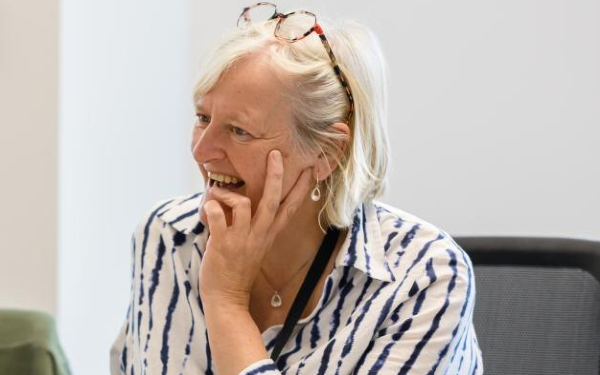
The government is planning to test devolving some of the Adoption and Special Guardianship Support Fund to regional adoption agencies (RAAs).
Under the plan, the Department for Education will allocate a small chunk of the ASGSF’s £50m budget to Adoption England, the national DfE-funded body that supports RAAs.
It will then allocate this among five RAAs or pan-regional groups, who will test the devolution of the ASGSF, which funds therapies for care-experienced children in adoptive and permanent kinship placements.
The news was revealed by Adoption England head Sarah Johal, in an interview with Community Care that followed widespread sector anger over the DfE’s recent handling of the fund.
Anger over DfE’s handling of ASGSF
The department only confirmed that the fund would continue into 2025-26 on 1 April, the start of the financial year.
Charities and providers warned this had caused significant anxiety for children and families about whether their services would continue – potentially exacerbating their trauma – while also leading to damaging breaks in their therapy
The DfE then significantly cut maximum annual payments for therapy packages to £3,000 a year, including any assessments.
Cuts in maximum therapy payments
The previous therapy limit was £5,000, with a separate £2,500 allowance for specialist assessments and scope for the ASGSF to match fund, with local authorities, the cost of packages up to a maximum £30,000 a year.
As well as cutting the value of therapy available through the ASGSF, the decision meant councils and RAAs would have to review and resubmit many applications already lodged with the fund to fit with the new £3,000 limit.
This is likely to have increased waits for services for children and families. However, the DfE has mitigated the impact by allowing RAAs and councils to make retrospective applications, until the end of June, for ASGSF funding for therapy that has already begun.
Sector ‘given no time to prepare’ for fund limit changes
Johal, the national strategic adoption lead, said Adoption England and the wider sector had not had advanced warning of the government’s 2025-26 plan for the ASGSF.
“Had we had advanced notice of that and had the government worked with the sector, we could have found a way to make sure that applications met that fair access limit,” she said.

Sarah Johal, national adoption strategic lead (photo from Adoption England)
“So, it’s a bit disappointing that it’s happened at this point because we have quite a lot of applications in process, which means there are more delays, more families having to wait longer.”
The future of the ASGSF beyond March 2026 is subject to the government’s spending review, which reports next month, and in the meantime the DfE is reviewing how the fund should operate.
Johal said that, as part of this, it has agreed to pilot devolving funding to RAAs.
Piloting regional devolution of ASGSF
“We have agreement from the DfE to pilot a different approach, We have five pilot sites across the country, with RAA and pan-regions trialling the devolvement of the budget for some areas of provision,” she said.
“We would oversee the budget for the five pilots and they would look at a range of provision within their areas.”
The regional agencies/pan-regions will carry out specialist assessments and deliver therapeutic post-adoption support, through RAAs’ multidisciplinary teams, while also commissioning services from therapy providers.
The DfE has separately funded Adoption England to develop multidisciplinary teams – comprising professionals including clinical psychologists, occupational therapists and social workers – in seven areas, with a further two coming on stream this year.
Plan to ‘reduce reliance’ on specialist therapeutic support
Johal said the areas testing the devolution of the ASGSF would try out different approaches to funding adoption support. For example, one will focus on developing therapeutic youth provision for children aged 12 and over.
She said the pilot’s aims included reducing reliance on highly specialist therapeutic support, by tailoring provision more to need, and tackling the “bureaucracy” involved for social workers in making applications to the ASGSF.
“The ASGSF, however fantastic it has been for families – and I wouldn’t want to underestimate the benefits and the prevention of disruptions to children – has almost created [an idea] that families feel they are entitled to therapeutic support, no matter whether the children need it or not.

Photo: Seventyfour/Adobe Stock
“So we’re driven to this specialist end of therapeutic support, whereas there’s a whole continuum.”
Instead, she said, Adoption England was looking to focus on early and preventive support as children move in with adoptive parents, by “really skilling up parents to meet the needs of their children and then addressing, as children get older, their potential individual needs”.
Shifting social work role from paperwork to direct work
This would involve a shift in adoption social workers’ role from paperwork to direct work.
“Quite a lot of social workers feel quite deskilled in terms of the work we do – they’ve become commissioners, not providers of support,” said Johal.
“We’re trying to get back to good old social work, having somebody alongside you, empowering and supporting you, understanding the issues – that can be very beneficial for families.
“A lot of social workers feel like they haven’t been able to do that because they’ve been having to fill out forms for the ASGSF.”
Adoption England ‘well placed’ to oversee support provision
Johal said she hoped the DfE would consult with Adoption England and the sector on the future of the fund beyond March 2026, and that that her organisation was “well placed” to take oversight of work regarding adoptive families.
“We have a whole programme of improvement work with the RAAs around adoption support, multidisciplinary approaches and commissioning of services with an aim to achieve consistency of support across the country.
“On our the website, we’ve got a national picture of need, we’ve been working with the regions to look at their own pictures of need, so we can address any gaps in provision with providers.
“So it would make much more sense to do that with Adoption England and through the regional agencies.”
Transferring fund to councils ‘would feel like backward step’
She said another possible option was to transfer the ASGSF to local authorities.
“For adoptive families this would feel like a backward step given the regionalisation journey [under which RAAs have taken responsibility for local authorities’ adoption functions],” she said. “Additionally, given the public finances of local authorities I would be concerned that the fund would not be able to ring fenced for adoptive families.”

Photo: chrupka/Adobe Stock
She gave the example of the grant to resource the extension of the virtual school heads role to children with a social worker or in kinship care, which has been rolled into the children and families grant, a new broader-based fund for councils.
“We’re already seeking that people are not able to ring-fence the amount of cover that they’ve had [for virtual school heads] so we’re worried that [the ASGSF] wouldn’t get to the right people if that’s what happened.”
However, she added that transferring funding to councils “might be right for the element of the fund that’s related to kinship carers and special guardians because we definitely need to do something more bespoke for that group”.
ASGSF cap ‘likely to have biggest impact on most vulnerable’
In the meantime, Johal warned that the reduced cap on ASGSF funding would likely have the biggest impact on the most vulnerable children, for whom £3,000 would not be sufficient to fund a therapy package.
“Regional agencies will do what they can in terms of supporting those families, and therapeutic services will as well,” she said.
“We know the pressure on CAMHS services and often they refer children and families back to the ASGSF for support.
“So there is going to be a gap, I think, in terms of how we meet the needs of those children, which I’m concerned about and I don’t have an easy answer to.”
Echoing the concerns of other sector leaders, she added: “I think we should be, potentially, really worried about children on the edge of care, placements disrupting, children potentially coming back into care.
“That’s the worry about when you withdraw something that’s so supportive like this.”
Growing shortage of adopters
The controversy over the ASGSF comes amid a growing shortage of families for children placed for adoption.
As of 31 December 2024, adoption agencies were engaged in active family finding for 1,750 children, for whom they needed to find 1,340 families, taking into account sibling groups, according to the latest cut of the Adoption and Special Guardianship Quarterly Data Collection.
However, just 720 adopter families were involved in active family finding, 54% of what was needed, leaving a shortfall of 620, said the quarterly report, produced for the Department for Education by the charity Coram-i.

Photo: IQoncept/Adobe Stock
This compares with a gap of 265 adopter families as of 31 March 2024, when agencies were seeking families for 1,100 children or sibling groups, with 845 families available to match them with, 77% of what was needed.
The situation has arisen due to a consistent gap of 300-400 between the number of placement orders made for children (roughly 800-850) and the number of adopters approved (about 400-500) per quarter.
Sector ‘must go further and faster’ – minister
In a letter confirming £8.8m of core funding for Adoption England in 2025-26, children’s minister Janet Daby said the sector needed to go “faster and further” in relation to recruitment, matching and support.
“We are not recruiting enough adopters, matching children quickly enough, and not all adoptive families are receiving the support they need,” she wrote.
Johal warned that the news regarding the ASGSF risked worsening adopter recruitment challenges.

Photo: yavdat/Adobe Stock
“When prospective adopters research adoption they look on social media and other adoptive parent forums and adoption support is critical when considering adoption and these changes may well impact on the recruitment of adopters.”
She said the causes of the shortages of adopters were multiple, including cost of living pressures, a lack of financial support for adoptive parents, children’s high levels of support needs and easier access to fertility treatment and surrogacy.
Adoption England is working with RAAs in 2025-26 on the national You Can Adopt campaign, while also funding targeted work to boost the recruitment of Black and LGBTQ+ adopters, along with families for disabled children.
Falling number of placement orders
The latest adoption data shows that, in the last quarter of 2024, the number of placement orders issued by the courts fell to 680, from a quarterly average of 812.5 over the previous two years.
Johal said this may reflect, in part, the courts reacting to the shortage of adopters.
“I think the courts may be reacting. We’re seeing placement orders being declined, sometimes because of issues to do with contact.
“And then sometimes, the courts think, ‘the likelihood of adoption, when we’ve got this recruitment crisis [is low]’, then they are looking at long-term fostering, even though there’s a crisis in long-term fostering.”
“I think what we’d ideally like to have a bit of twin-tracking, parallel planning, so you find the right family.”







 Bournemouth, Christchurch and Poole
Bournemouth, Christchurch and Poole  Hampshire County Council
Hampshire County Council  Oxfordshire County Council
Oxfordshire County Council  South Gloucestershire Council
South Gloucestershire Council  Wokingham Borough Council
Wokingham Borough Council  Embedding learning in social work teams through a multi-agency approach
Embedding learning in social work teams through a multi-agency approach  The family safeguarding approach: 5 years on
The family safeguarding approach: 5 years on  Harnessing social work values to shape your career pathway
Harnessing social work values to shape your career pathway  Webinar: building a practice framework with the influence of practitioner voice
Webinar: building a practice framework with the influence of practitioner voice  Workforce Insights – showcasing a selection of the sector’s top recruiters
Workforce Insights – showcasing a selection of the sector’s top recruiters  Free CPD on Parkinson’s for health and social care staff
Free CPD on Parkinson’s for health and social care staff 

 Facebook
Facebook X
X LinkedIn
LinkedIn Instagram
Instagram
No comments yet.